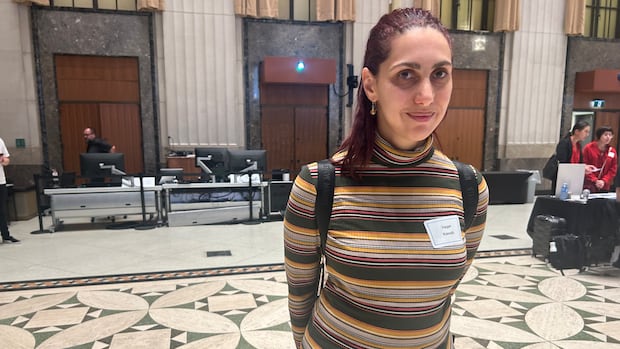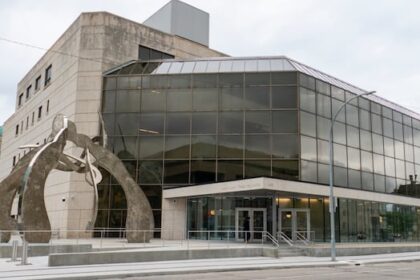OttawaA job fair meant to help connect job seekers with autism with employment opportunities drew in hundreds of attendees looking for work in Ottawa.Annual event comes amid worsening job marketJodie Applewaithe · CBC News · Posted: Oct 08, 2025 4:00 AM EDT | Last Updated: October 8A job fair meant to help connect job seekers with autism to employment opportunities drew in hundreds of attendees looking for work in Ottawa on Tuesday. (Jodie Applewaithe/CBC)Hager Kassab says she’s been job hunting for so long she’s lost track of how many years she’s spent looking.Kassab lives in Cornwall, Ont., but wants to move to Ottawa to be closer to family. “It’s hard for me specifically to find work because there’s not a lot of jobs out there for people who have [a] disability,” she said.Kassab is one of the hundreds of people who showed up at a job fair for autistic people Tuesday at the Sir John A. Macdonald Building in downtown Ottawa.Hager Kassab was one of the hundreds of job seekers who attended the Spectrum Works Career Fair in downtown Ottawa. (Jodie Applewaithe/CBC)The Spectrum Works Career Fair is an annual event, held this year in Ottawa and Toronto, dedicated to creating meaningful employment opportunities for job seekers with autism.This edition of the career fair comes amid a harsh job market. According to Statistics Canada, the unemployment rate rose to 7.1 per cent in August – the highest rate since May 2016, excluding the pandemic years.As unemployment climbs, the promise of a grocery store job lures hundredsFor people with disabilities, the numbers are even more bleak. I’ll get to the interview portion, and then I tell them I have a limited amount of hours because of my disability and then it’s like crickets.- Greyson Toombes, job seekerAcross Canada, Statistics Canada has observed lower employment rates for people with disabilities compared to those without. The body says the largest gaps last year were observed in Quebec and Ontario.According to the 2017 Canadian Survey on Disability, only 33 per cent of Canadians between the ages of 20 and 64 with autism are employed.Neil Forester, the co-founder of Spectrum Works, said the job fair was designed to change that.”It’s really about bridging that gap,” he said.Discrimination in the job searchAccording to Forester, the Ottawa job fair met its capacity with 300 people registering to attend.The event featured 11 employers and several agencies aimed at helping job seekers find work — a beacon of hope for some of the candidates who dropped by.”To find an event like this is really exciting,” said Greyson Toombes.Since he graduated from Algonquin College’s radio broadcasting program in April, Toombes said looking for a job has been “disheartening.”Greyson Toombes has been looking for a job since he graduated from Algonquin College’s radio broadcasting program in April. (Jodie Applewaithe/CBC)”I’ll get to the interview portion, and then I tell them I have a limited amount of hours because of my disability and then it’s like crickets. I get ghosted.””It’s not fair that they kind of discriminate against us because we can do things the same as everyone else,” Toombes continued. “We just might need a little more time or a little more understanding than your typical candidate.”Another attendee, Rodney Smith, said he’s come up against similar barriers during his job search. It began last February when he was laid off from his retail job.”In the interviews, I think they noticed I sound different when I answer questions,” said Smith.A glimmer of hope for job seekersForester, the job fair’s co-founder, said the event has connected hundreds of people to jobs since it began in 2017.”We have been very successful in finding a lot of people employment and I think that’s what really kind of pushes us to keep doing this event.”Annual autism job fair aims to help seekers, employers connectWhile many walked away from the event hopeful, some job seekers were skeptical about whether any job prospects would arise from the career fair.”It’s not a lot [of hope], but it is a little,” Kassab said before surveying the remaining booths. Given how long and arduous her job search has been, Kassab said she’ll take whatever crops up.”I’m open to anything that is accommodating to part-time [work] and the hours I can do,” she said.Toronto’s job fair happens Oct. 17. ABOUT THE AUTHORJodie Applewaithe is an associate producer with CBC Ottawa. You can reach her at jodie.applewaithe@cbc.ca
Thursday, 5 Mar 2026
Canada – The Illusion
Search
Have an existing account?
Sign In
© 2022 Foxiz News Network. Ruby Design Company. All Rights Reserved.
You May also Like
- More News:
- history
- Standing Bear Network
- John Gonzalez
- ᐊᔭᐦᑊ ayahp — It happened
- Creation
- Beneath the Water
- Olympic gold medal
- Jim Thorpe
- type O blood
- the bringer of life
- Raven
- Wás’agi
- NoiseCat
- 'Sugarcane'
- The rivers still sing
- ᑲᓂᐸᐏᐟ ᒪᐢᑿ
- ᐅᑳᐤ okâw — We remember
- ᐊᓂᓈᐯᐃᐧᐣ aninâpêwin — Truth
- This is what it means to be human.
- Nokoma










